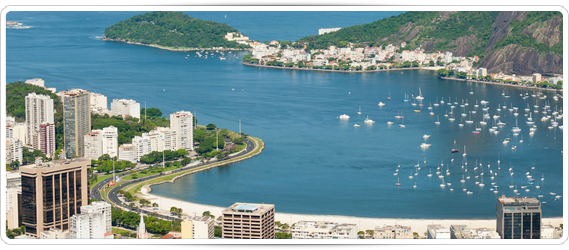Policy
Rio de Janeiro, Brazil
Rio de Janeiro, Brazil, a global city renowned for beautiful beaches and vibrant culture, is also increasingly known for its leadership on urban sustainability. With a metropolitan area of 11 million people, the City faces an array of challenges related to transportation, housing, sanitation, environmental protection, and development; however, with the 2014 FIFA World Cup and the 2016 Olympic Games on the horizon, the City and State of Rio de Janeiro are investing in innovative responses to these challenges.
Policies, financing, and creative programs are providing the backdrop for urban revitalization and sustainable growth in Rio de Janeiro. For example, the 'Morar Carioca' program is improving housing and services in informal settlements, while 'BikeRio' is creating a cycling culture around cleaner and more accessible transport, and Bolsa Verde do Rio de Janeiro lays the groundwork for innovative emissions, effluent, and ecosystem services markets. Across this City, agencies from all levels of government, non-governmental organizations, academia, and the private sector are working together to approach long-standing and emerging challenges with fresh ideas and clear commitment.
On this site, you will find some of the ways that Rio de Janeiro is building towards a green, innovative, inclusive future.
Letter from Eduardo Paes (English and Portuguese)
 Construction and Demolition Materials Management
Construction and Demolition Materials Management
EPA's construction and demolition (C&D) materials management policies focus on safe, beneficial use of the debris generated during construction, renovation, and demolition of buildings, roads, and bridges in order to conserve landfill space, avoid the resource impacts of new materials, create jobs, and reduce new project expenses.
Morar Carioca: Integrating Informal SettlementsAs in many large cities in the developing world, a large portion of the population of Rio de Janeiro lives in informal settlements or slums, called favelas.
Municipal Recycling Collection ExpansionCurrently, the City of Rio de Janeiro gathers only 1 percent of recyclables through official collection of separated materials, and reaches less than one-third of the City through its efforts.
Rio "Bicycle Capital City"Increased bicycle infrastructure in urban environments promotes the importance of cycling as a mode of transportation, resulting in improved urban mobility, environmental quality, social inclusion, and economic benefits.
Sub-National Climate Change PoliciesUnderstanding the challenge that climate change presents at a sub-national level, both the State and the City of Rio de Janeiro have passed nation-leading sub-national climate change laws and instituted policies to decrease emissions and improve sustainability in the region.






